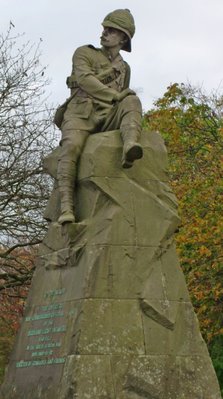
How do you do, Private William McBride,
Do you mind if I sit down here by your graveside?
And rest for awhile in the warm summer sun,
I've been walking all day, and I'm nearly done.
I see by your gravestone you were only 19
When you joined the great fallen in 1916,
I hope you died quick and I hope you died clean
Or young Willie McBride, was it slow and obscene?
Did they Beat the drum slowly, did the play the pipes lowly?
Did the sound the death march as they lowered you down?
Did the bugles sound The Last Post in chorus?
Did the pipes play the Flowers of the Forest?
Did you leave a young wife or a sweetheart behind
In some faithful heart is your memory enshrined?
Though I know that you died back in 1916,
In that faithful heart are you forever 19?
Or are you a stranger without even a name,
Enclosed and forever behind a glass pane,
In an old photograph, torn and tattered and stained,
And fading to yellow in a brown leather frame?
Did they Beat the drum slowly, did the play the pipes lowly?
Did the sound the death march as they lowered you down?
Did the band play The Last Post in chorus?
Did the pipes play the Flowers of the Forest?
The sun shines bright on the green fields of France;
The warm summer breeze makes the red poppies dance.
The trenches are scattered long under the plow;
No gas and no barbed wire, there's no guns firing now.
But here in this graveyard that's still No Man's Land
The countless white crosses are mute where they stand
To man's blind indifference to his fellow man.
And a whole generation that were butchered and damned.
Did they Beat the drum slowly, did the play the pipes lowly?
Did the sound the death march as they lowered you down?
Did the band play The Last Post in chorus?
Did the pipes play the Flowers of the Forest?
I can't help but wonder, young Willie McBride,
Do those who lie here really know why they died?
Did they believe when they answered the call,
Did they really believe that this war would end wars?
The suffering, the sorrow, the glory, the shame
The killing, and the dying, it was all done in vain,
For young Willie McBride, it all happened again,
And again, and again, and again, and again.
This song was written after after the writer visited a military cemetery in France. It does a fine job of illustrating the meaningless absurdity of war. The First World War was the last real trench war and in France and Belgium battles could last weeks or months without any progress.
A researcher from a Belgium war museum has delved in a stack of burial records to find the real Willy McBride. Among the 1,700,000 names he found ten William Willy McBride's, but only one died in 1916 at the age of 19.
During the First World War No Man's Land was clearly defined by the trenches. Sometimes the contending parties where so close to each other that they could overhear the conversation of their opponents and many men, unaware of the nearness of the enemy snipers, died on their first day in the trenches.
In contrast with what the term might suggest No Man's Land was by no means abandoned. Under the cover of darkness the parties continuously repaired or extend the barbed wire fencing and carried out reconnaissance missions. Consequently artillery shelling of No Man's Land was common. Those who got injured often had to suffer a whole day before being rescued, while corpses were seldom salvaged.
The Last Post and The Flowers of the Forest are compositions associated with the final farewell.
In wars of a previous age bugles and drums marked the phases of a soldier's day, which started with the wakeup call Reveille. At the end of the day officers, accompanied by bugle players and drummers, made a round along the posts. The start of this round was announced by The First Post and the end by The Last Post, therewith signalling that all sentry posts were manned and that it was safe for off-duty soldiers to go to sleep. In the course of time The Last Post was incorporated into funeral and memorial services as a final farewell and symbolises that the duty of the fallen is over and that they can rest in peace.
The Flowers of the Forest is a poem written in the mid-1750's. It refers to the Battle of Flodden, which took place in 1513 between the Scots and the English. The outcome was disastrous for the Scots as it is estimated that about 10,000, including King James IV of Scotland, were killed. The Flowers of the Forest, traditionally played on a bagpipe, has become a lament for lost relatives, whereas the bugle call The Last Post is a final salute for fallen fellow soldiers.
Sadly just as they did then, men are still making that same sacrifice today.
No comments:
Post a Comment